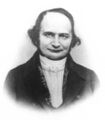Template:Selected anniversaries/February 18: Difference between revisions
No edit summary |
No edit summary |
||
| Line 7: | Line 7: | ||
File:Carl Gustav Jacob Jacobi.jpg|link=Carl Gustav Jacob Jacobi (nonfiction)|1851: Mathematician and academic [[Carl Gustav Jacob Jacobi (nonfiction)|Carl Gustav Jacob Jacobi]] dies. He made fundamental contributions to elliptic functions, dynamics, differential equations, and number theory. | File:Carl Gustav Jacob Jacobi.jpg|link=Carl Gustav Jacob Jacobi (nonfiction)|1851: Mathematician and academic [[Carl Gustav Jacob Jacobi (nonfiction)|Carl Gustav Jacob Jacobi]] dies. He made fundamental contributions to elliptic functions, dynamics, differential equations, and number theory. | ||
File:J._R._Oppenheimer.jpg|link=J. R. Oppenheimer|Singer-physicist [[J. R. Oppenheimer]] performs his hit song "Destroyer of Worlds" at the Grand Ole Opry, leading to his being summoned before the House Un-American Activities Committee. | |||
File:J. Robert Oppenheimer.jpg|link=J. Robert Oppenheimer (nonfiction)|1967: American physicist and academic [[J. Robert Oppenheimer (nonfiction)|J. Robert Oppenheimer]] dies. His achievements in physics included the Born–Oppenheimer approximation for molecular wavefunctions, work on the theory of electrons and positrons, the Oppenheimer–Phillips process in nuclear fusion, and the first prediction of quantum tunneling. Oppenheimer has been called the "father of the atomic bomb" for his role in the Manhattan Project. | File:J. Robert Oppenheimer.jpg|link=J. Robert Oppenheimer (nonfiction)|1967: American physicist and academic [[J. Robert Oppenheimer (nonfiction)|J. Robert Oppenheimer]] dies. His achievements in physics included the Born–Oppenheimer approximation for molecular wavefunctions, work on the theory of electrons and positrons, the Oppenheimer–Phillips process in nuclear fusion, and the first prediction of quantum tunneling. Oppenheimer has been called the "father of the atomic bomb" for his role in the Manhattan Project. | ||
</gallery> | </gallery> | ||
Revision as of 07:06, 18 February 2022
901: Physician, astronomer, and mathematician Thābit ibn Qurra dies. He made important discoveries in algebra, geometry, and astronomy; in astronomy, Thabit was one of the first reformers of the Ptolemaic system.
1201: Polymath Nasir al-Din al-Tusi born. Tusi will be a mathematician, architect, philosopher, physician, scientist, and theologian; he will establish trigonometry as a mathematical discipline in its own right.
1851: Mathematician and academic Carl Gustav Jacob Jacobi dies. He made fundamental contributions to elliptic functions, dynamics, differential equations, and number theory.
Singer-physicist J. R. Oppenheimer performs his hit song "Destroyer of Worlds" at the Grand Ole Opry, leading to his being summoned before the House Un-American Activities Committee.
1967: American physicist and academic J. Robert Oppenheimer dies. His achievements in physics included the Born–Oppenheimer approximation for molecular wavefunctions, work on the theory of electrons and positrons, the Oppenheimer–Phillips process in nuclear fusion, and the first prediction of quantum tunneling. Oppenheimer has been called the "father of the atomic bomb" for his role in the Manhattan Project.




